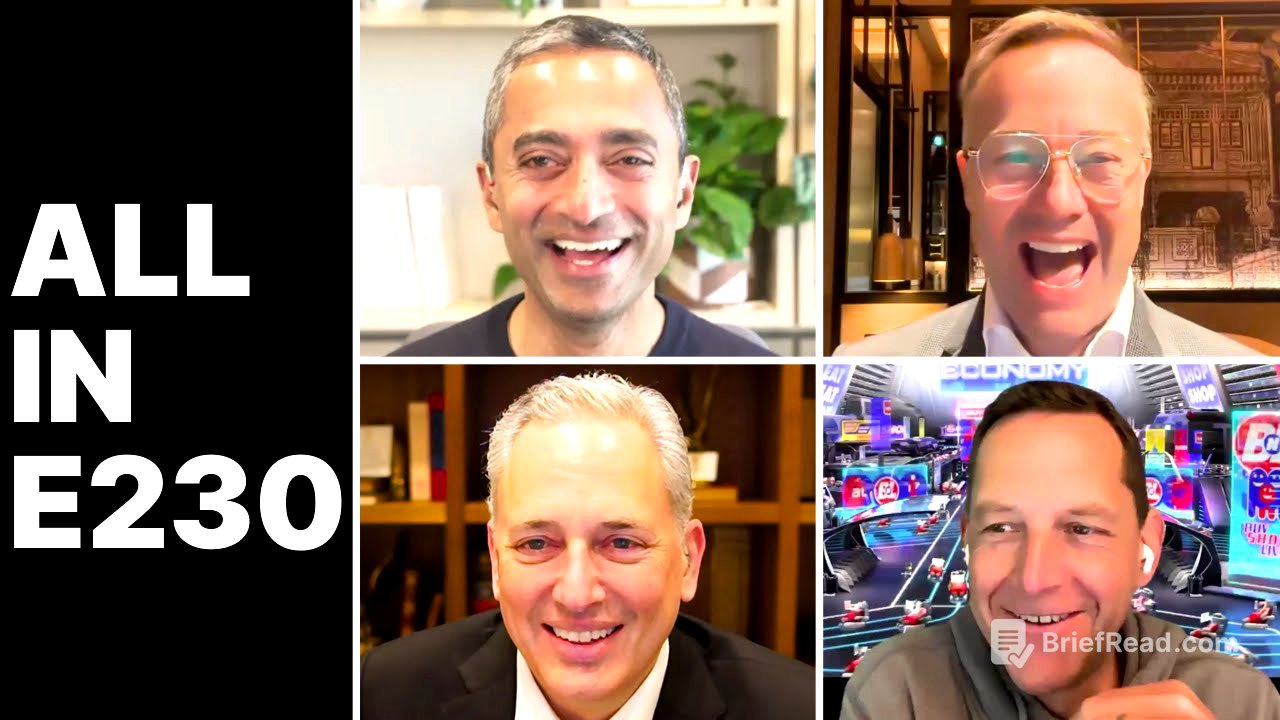TLDR;
The All-In Podcast discusses AI's potential impact on jobs, the motivations behind AI safety concerns, and the balance between innovation and regulation. The conversation also covers the US debt, budget, and economic strategies, including energy policy and trade.
- AI and Job Displacement
- AI Safety and Regulation
- Economic Strategies and Fiscal Policy
- Energy Policy and GDP Growth
Intro [0:00]
The All-In Podcast returns with the original quartet, discussing various topics, including AI doomerism and its potential impacts on employment. The conversation begins with a lighthearted exchange about David Sachs' Brioni shirt, setting a casual tone before diving into more serious subjects. The All-In Summit is announced for its fourth year, aiming to host important conversations.
AI Doomerism and Job Displacement [1:07]
The podcast addresses concerns about AI leading to mass job elimination across sectors like tech, finance, legal, and consulting, with entry-level workers being the hardest hit. Dario Amod's prediction of a significant employment spike is mentioned, alongside the call for lawmakers and CEOs to take action. The discussion explores whether these concerns are legitimate or hyped for an agenda, questioning the likelihood of regulatory capture through AI safety bills.
The AI Safety Debate and Industrial Complex [2:49]
The discussion covers the concerns and risks associated with AI, including the potential for misuse in creating bioweapons and the development of super intelligence. It is argued that these concerns are being exaggerated, possibly to grab headlines or push a specific agenda. The existence of an "AI existential risk industrial complex," funded by effective altruism (EA) proponents like Dustin Moskovitz, is examined, suggesting a coordinated effort to promote global AI governance.
Economic Perspectives on AI and Job Creation [5:00]
The conversation shifts to the economic impact of AI, with an argument that AI increases the return on invested capital, leading to more capital deployment and job creation. The potential for AI to automate tasks, such as software engineering and driving, is discussed, but it's argued that this will lead to new opportunities and industries rather than mass unemployment. The discussion highlights the importance of considering the counterbalancing effects of technology on the economy.
Government Regulation and Global Competition in AI [8:15]
The discussion explores the idea that safety warnings about AI often coincide with fundraising moments for companies like Anthropic, suggesting a strategic marketing approach. The influence of the effective altruism (EA) movement and its agenda for global AI governance are examined, with concerns raised about potential overregulation and government control. The importance of winning the AI race against China is emphasized, advocating for innovation, infrastructure development, and AI diplomacy.
The Pace of Change and Deflationary Effects of AI [25:14]
The conversation addresses concerns about the speed of job displacement due to AI, particularly for drivers and entry-level workers. It's argued that the benefits of the AI revolution, such as lower costs and increased availability of products, will counterbalance job losses. Examples of automation in food preparation are given to illustrate the potential for deflationary effects and improved lifestyles.
AI's Impact on Employment and the Economy [30:53]
The discussion continues on AI's impact on employment, with the argument that AI will drive GDP growth and create new jobs, as seen in previous industrial revolutions. The potential for AI to increase revenue per employee and create more abundance is highlighted. The conversation also touches on the difficulty of completely eliminating human jobs and the need for government intervention to be carefully considered.
The Future of Work and the Role of AI Natives [34:03]
The conversation shifts to the impact of AI on entry-level jobs and the importance of being AI-native. It's argued that AI is making junior programmers more productive and leveling the playing field. The discussion also touches on the potential for AI to replace management roles, with AI tools being used to monitor employee productivity and generate management reports.
AI and National Competition [44:32]
The discussion shifts to whether there is a race in AI between nation states. While AI is a system of productivity that could benefit everyone, there is an intense competition around AI because of its dual use for economic and military benefits. The worst case scenario is that China wins the AI race and achieves a decisive advantage, leading to them selling more products and services around the globe than the US.
The Big Beautiful Bill and US Debt [52:44]
The podcast revisits the discussion on the big beautiful bill (BBB) and the US debt, addressing factual inaccuracies and providing clarifications. It's explained that the BBB cuts spending but is not scored that way due to the CBO's assumptions. The conversation explores whether the Trump administration will reduce the deficit and balance the budget, with differing opinions on the likelihood and impact of the bill.
Economic Analysis and the Role of GDP Growth [58:58]
The discussion continues on the BBB, with a focus on the Congressional Budget Office (CBO) and its methods for scoring the bill. Concerns are raised about the CBO's assumptions and the need for independent analysis. The importance of GDP growth is emphasized, with a call to improve energy policy to ensure a robust energy market and drive economic growth.
Energy Policy and Economic Growth [1:05:19]
The conversation emphasizes the importance of energy policy for GDP growth, highlighting the need to maintain a robust energy market and avoid energy contraction. The timelines for bringing new energy sources online are discussed, with a focus on renewable and storage options. The discussion stresses the need to strip away partisanship and understand the critical role of energy in driving economic growth.
Strategic Industries and Government Intervention [1:17:11]
The discussion shifts to the Nippon Steel and US Steel merger, with a reframing of the deal as a partnership that will benefit the United States. The conversation explores the idea of the government taking a more active role in strategic industries, similar to other countries like Brazil, the UK, and China. The potential for the government to take equity in companies is discussed, with differing opinions on the merits of government intervention in the free market.
Social Security and Retirement Funds [1:23:17]
The conversation explores the idea of the government investing retirement funds in strategic assets, similar to sovereign wealth funds in other countries. The need to reform Social Security is emphasized, with concerns raised about its impending bankruptcy. The discussion calls for leadership to address the issue and make necessary changes to ensure the long-term solvency of Social Security.









